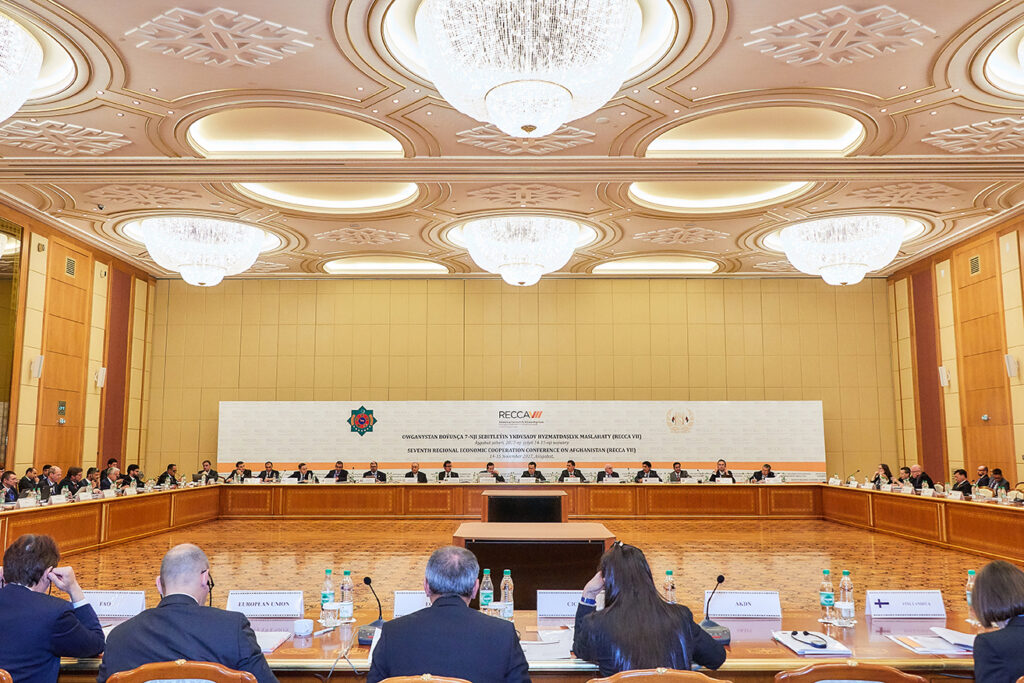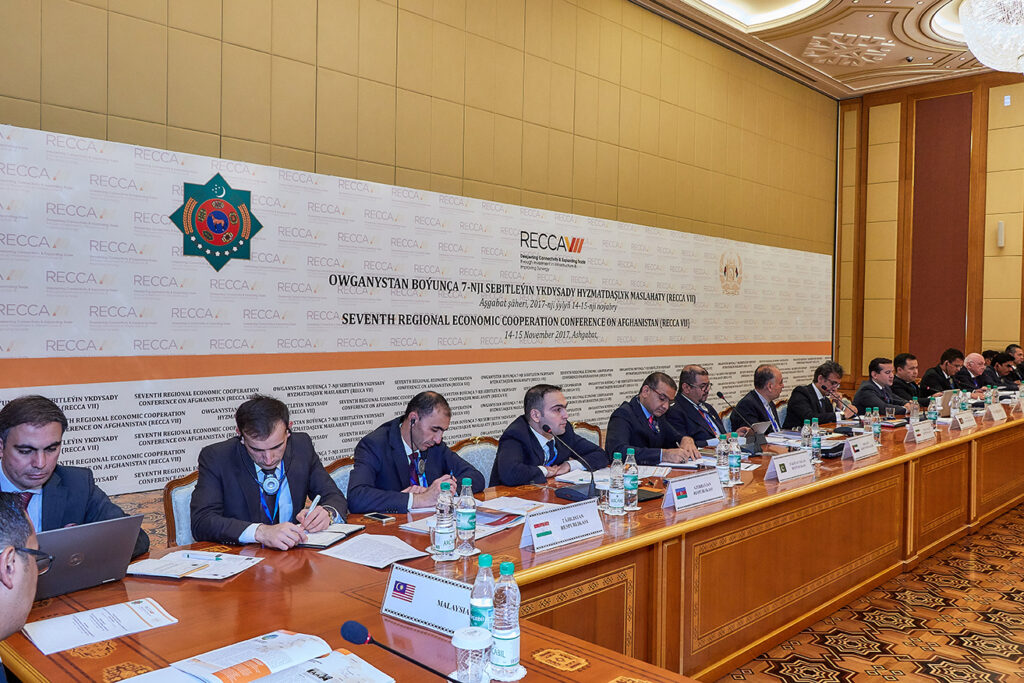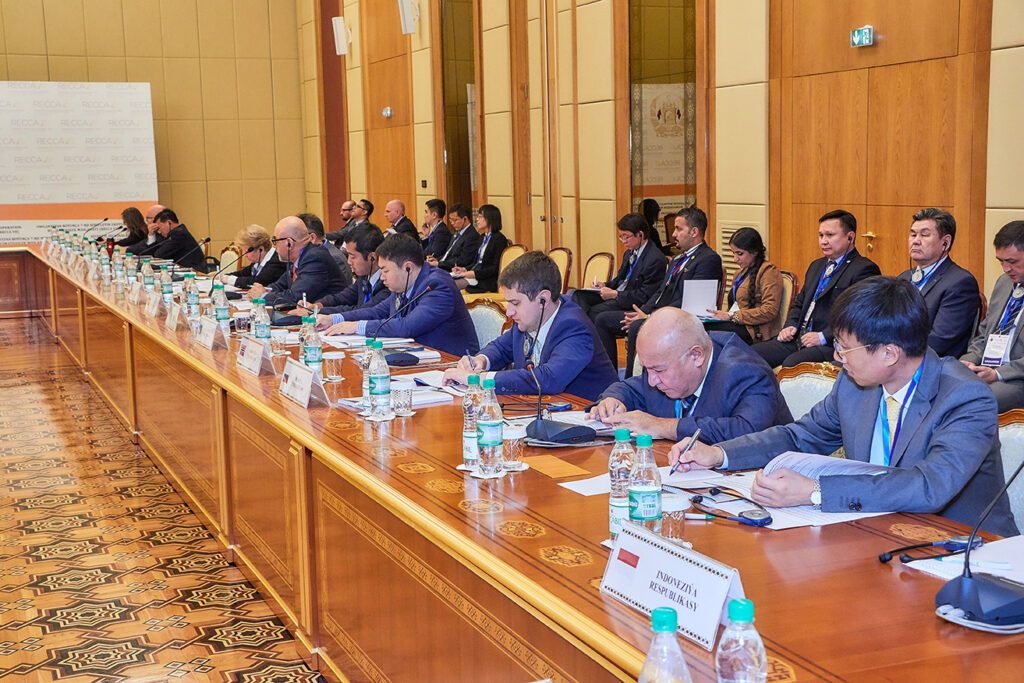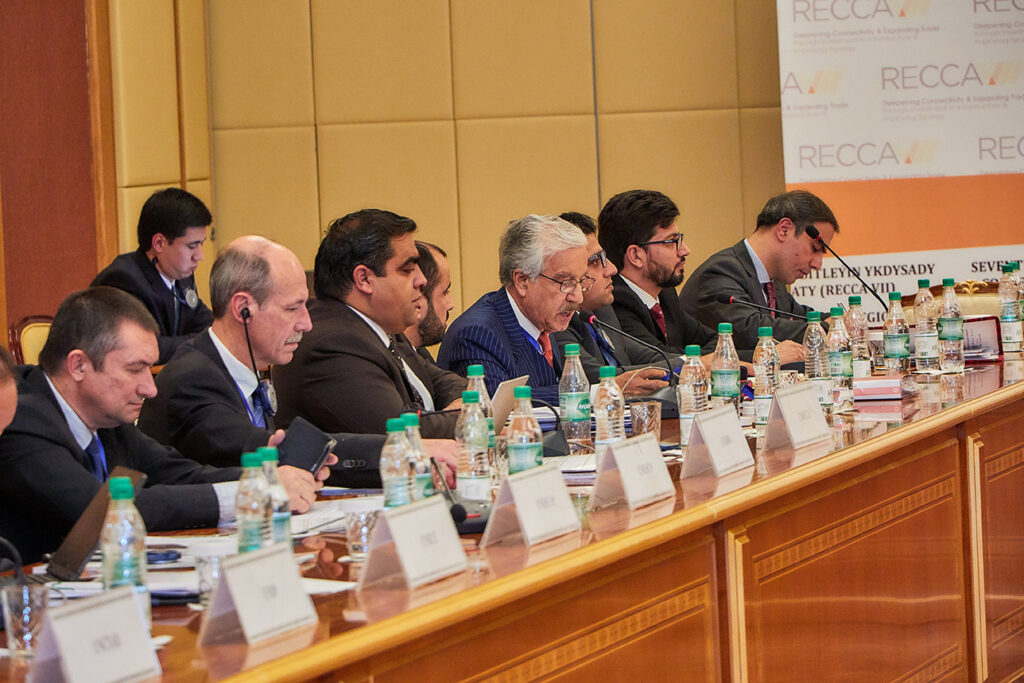
As part of the biannual ministerial meetings of the RECCA, three Working Group Meetings (WGMs) were held on the first day of the Conference centered on three important areas: i) energy and natural resources; ii) regional connectivity, and iii) regional trade, private sector development, business-to-business cooperation, and labor support. The Working Group Meetings were opened with remarks by H.E. Vepa Hajiyev, Deputy Foreign Minister of Turkmenistan and H.E. Adela Raz, Deputy Foreign Minister for Economic Cooperation of Afghanistan. Deputy Minister Raz, among other issues, highlighted the importance of the theme of this year’s RECCA: “Deepening Connectivity and Expanding Trade through Investment in Infrastructure and Improving Synergy” and stated that the theme reflects that our collective efforts need to be intensified towards addressing the common gaps, including infrastructure deficit and investment needs. Deputy Minister Raz also spoke about the RECCA Annual Review 2017 and said that “this year’s review highlights key challenges and implementation bottlenecks as well as the investment needs with regard to the priority projects.” She expressed hope that the deliberations in the three working group meetings would help us further identify the challenges as well as the cooperation opportunities that exist in our wider region.

First Working Group Meeting: Regional Energy & Natural Resource Cooperation
Co-Chairs:
- E. Ajmal Ahmady, Senior Advisor to the President and TAPI Project Board Director, Afghanistan
- Muhammetmyrat Amanov, CEO of TAPI Pipeline Company Limited (TPCL)
Speakers:
- E. Amanullah Ghalib, CEO, Da Afghanistan Breshna Sherkat
- V. Rahmanov, Director of the Turkmenenergotaslama Research Institute, Ministry of Energy
- E. Samuel Tumiwa, ADB Country Director for Afghanistan
- Vishwesh Negi, Director of PIA, Ministry of External Affairs, India
- Shahbaz Hussain, Deputy Head of Mission, Embassy of Pakistan, Kabul
The salient points raised in the first WGM included the following:
- As demand for electricity is increasing, Afghanistan is no longer a bottleneck.
- Central Asia is in possession of significant energy resource endowments, whereas South Asia possesses a large and growing population, creating ideal complementarity for increased energy connectivity between them, with Afghanistan situated in the middle of these two key regions.
- TAPI in particular is moving steadily toward the Implementation Phase of the project, which has included a series of conferences in Afghan provinces which have helped win local and public support for the project.
- While CASA will supply electrical power to northern Pakistan, TAP will supply it to southern Pakistan.
- ADB has focused intently on electricity transmission projects, with TUTAP being about getting electricity to Afghanistan and CASA 1000 being about using Afghanistan as a transmitter of power to elsewhere in the region.
- The challenge is to integrate TUTAP and CASA, which is the principal role of the TAP project – TAP will be a major source of Afghanistan’s energy supply.
- Afghanistan is an important energy transit corridor, and India has been helping in recent years with increasing the energy supply to it and through it; natural gas is set to become a critical part of India’s energy future.
- Pakistan fully subscribes to the Afghan regional economic integration strategy, which is in sync with Pakistan’s national policy.

Second Working Group Meeting: Regional Connectivity
Co-Chairs:
- E. Mohammad Ismail Rahimi, Deputy Minister of Economy, Afghanistan
- E. A. Kosayev, Deputy Minister of Automobile Transport, Turkmenistan
Speakers:
- E. Mohammad Yama Shams, Director General, Afghanistan Railway Authority
- N. Orazov, Logistic Director, Ministry of Railway of Turkmenistan
- Najib Azizi, Board Chairman, Afghanistan Telecom Regulatory Authority
- E. Mr. Sun Weidong, Ambassador of the People’s Republic of China to Turkmenistan
- Amin Farjad, Deputy of Afghanistan Affairs Department, Islamic Republic of Iran
- Maihan Saeedi, Director, South Asian Association for Regional Cooperation (SAARC).
The salient points raised in the second WGM included the following:
- Turkmenistan is situated at the crossroads of the main regional transport corridors.
- The contracting parties are pleased that the Lapis-Lazuli agreement is being signed at this conference.
- Subsequent to the signing of the Chabahar agreement in 2016, the first 170-ton shipment of wheat arrived in Afghanistan from India in October this year.
- The aim of Afghanistan is to expand corridors both north and south, bringing lower cost transport and better infrastructure as a whole to the region.
- The Tajik-Turkmen-Afghan Transnational Railroad project will connect provinces and create new jobs in these countries and beyond, including supporting security by improving the socio-economic condition of their populations.
- Peace and prosperity for the region is a goal, which has a central role as a pivot for regional connectivity and a key for Afghanistan to achieve stability.
- SAARC and RECCA’s throng of initiatives are complementary to each other, thus they could usefully explore working together on various projects and initiatives to increase regional connectivity and prosperity.
- The Baku-Tbilisi-Kars (BTK) railway network is a key contributor to regional east-west connectivity.

Third Working Group Meeting: Promoting Regional Trade, Private Sector Development, Business-to-Business Cooperation, and Labor Support
Co-Chairs:
- B. Gylyjov, Chairman of the Chamber of Commerce of Turkmenistan
- Mohammad Najib Azizi, Board Chairman, ATRA
Speakers:
- E. Enayatullah Nabiel, Senior Advisor, Ministry of Finance, Afghanistan
- Hassan Soroosh, Acting DG, Economic Cooperation, MoFA
- M. Myradov, Senior specialist, Ministry of Trade and Foreign Economic Relations, Turkmenistan
- Turkey
- Jean-Sébastien Roure, Senior Officer, Trade Facilitation and Policy for Business Section, ITC ,
- John Smith-Sreen, USAID Director for Afghanistan
- Atiqullah Nusrat, CEO, Afghanistan Chamber of Commerce and Industries
- Abdul Hamid Akbar, Director General for Planning and Policy, Ministry of Labour, Social Affairs, Martyrs, and Disabled
- Nasrullah Hassani Sahibzada, Executive Director, Afghanistan Airfields Economic Development Commission
The salient points raised in the third WGM included the following:
- Afghanistan became the 164th member of the WTO this year, which has upgraded the rules and commitments Afghanistan is making reegarding customs procedures and policies.
- Now foreign traders are granted visas upon arrival, including individuals and companies alike in a totally open policy of Afghanistan to the world.
- The range of Afghan companies and products in almost every conceivable sector of these maturing economies, from construction to tourism, are invited to trade with and invest in Turkmenistan.
- Turkey’s projects in Afghanistan are numerous and significant: including airports, roads, dams, and other kinds of infrastructure. Afghanistan is not only the Heart of Asia but in the heart of Turkey and the Turkish nation.
- Hard infrastructure is necessary but insufficient for increasing trade, and a regional visa is a worthy goal.
- USAID will invest in energy infrastructure connectivity and support regional trade, private sector, women’s empowerment, B2B, and labor initiatives. Afghanistan should focus on a few key areas in order to get to success, as success breeds success.
- There is an open invitation to RECCA countries to develop joint SEZs with one another; feasibility studies are required first, and then partners can reach out to investors in unison.
- Central South Asia is one of the least integrated regions in the world, marked by a lack of trade and transit agreements; however, significant recent progress has been made in the eyes of the private sector.
- The WTO platform is a crucial platform for negotiating new trade deals in the region, and a public-private aim should be to identify export sectors with comparative advantages and prioritize their development.
- There needs to be an emphasis on workforce development related to large infrastructure projects, and ensuring that development projects don’t just improve economic performance but also create jobs.
- The aim of the sizable Labor Exchange and Remittances Project involves the recruitment of over 200,000 Afghan guest workers and opportunities related to remittances.
- RECCA’s new approach involves the bankability of projects, as well as the synergy and complementarity at different levels: between RECCA and NPPs; between RECCA and other regional platforms; and between RECCA and transport corridors.
- RECCA-VII also presents several new projects: (1) a RECCA Joint Chamber of Commerce and Industry (RCCI), to connect businesses across the region and create joint ventures on priority projects; (2) a RECCA Women’s empowerment project, to help women-owned businesses by getting their products to regional and global markets; and (3) a RECCA Center for Research and Evaluation (CRE), to facilitate joint research and analytical initiatives/impact assessments/initial feasibility studies and ensure bankability so that investment roadshows can be organized.
- Overall there needs to be improved planning and monitoring of RECCA priority projects, increased involvement of other countries (with a move toward joint ownership and shared projects), and ongoing excellent work by the national focal points who have performed admirably.
